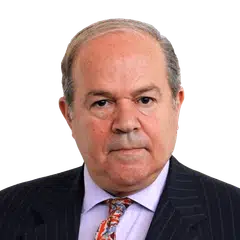News analysis
‘Many questions, few answers’: European leaders disagree on response to US-led ceasefire talks with Russia
Sign up now: Get ST's newsletters delivered to your inbox

(From left) Ukrainian President Volodymyr Zelensky, British Prime Minister Keir Starmer and French President Emmanuel Macron speak at the Elysee Palace in Paris, France.
PHOTO: EPA-EFE
LONDON – Britain and France have announced plans to send a joint military fact-finding mission to Ukraine “during the coming weeks”, as a prelude to the eventual deployment of European troops within Ukraine, should a ceasefire be concluded in that country’s war.
The Franco-British mission to Ukraine, hand-picked by the defence chiefs of the two nations, will include “a multidisciplinary team with specialists in doctrine, human resources and training”, a French military official told journalists on March 27.
This came at the end of yet another major international gathering of European leaders in Paris to discuss the continent’s stance on Ukraine.
Beyond the dispatch of this mission, however, European leaders were still in disagreement on how they should respond to the ceasefire negotiations conducted between the US and Russia, talks from which Europe remains excluded.
“Many questions, but still few answers”, is how a frustrated Ukrainian President Volodymyr Zelensky summed up the latest discussions in the French capital.
Since Feb 12, when US President Donald Trump, with Russian President Vladimir Putin, formally launched efforts to bring about a ceasefire in Ukraine,
They first reacted with outrage to the idea that ceasefire negotiations should take place without the participation of the Ukrainians.
The Europeans then tried to mediate between Mr Zelensky and Mr Trump, as personal relations between the two leaders nosedived.
Ultimately, European governments accepted that, since they stood no chance of influencing Mr Trump’s dealings with Russia, Europe’s most productive approach is to concentrate on providing Ukraine with security guarantees against potential future Russian aggression after a ceasefire is agreed on.
That was how the idea of deploying a European force on Ukrainian territory was born.
The objective is to deter Russia from contemplating a future invasion of Ukraine and reassure Ukraine that if it ever faced another Russian incursion, it would not do so alone.
The snag is that not all European governments agree about the need for such a force deployment.
Few of those who support the idea have the necessary military capabilities.
As a result, the project is led by Britain and France, who control Europe’s most capable armed forces and claim to act as leaders of what they call a “Coalition of the Willing” to include any other nation wishing to contribute to a potential multinational force.
A series of summits of potential contributors is being jointly hosted by British Prime Minister Keir Starmer and French President Emmanuel Macron.
The summits take place by rotation in either London or Paris.
The latest gathering on March 27 in the French capital was by far the largest, with top representatives from 31 countries, including most of the European Union heads of state and government and representatives from Australia, Canada and Turkey.
The message that Mr Macron sought to give was that Europe and the rest of the Western world should not stand aside as Ukraine increasingly falls victim to a potential deal concluded exclusively between Russia and the US.
The French leader also tried hard to persuade participants at the Paris summit to support the deployment of European troops in Ukraine.
Such troops, deployed alongside a core force of France and Britain, would “not be intended to be peacekeeping forces, to be present along the contact line or to replace Ukrainian forces”, Mr Macron explained.
Instead, they would be sent to “certain strategic locations pre-identified with the Ukrainians”.
They would act as a “deterrent character” around large cities or sensitive sites inside Ukraine, he added.
But in the absence of any American military support for such a force, few Europeans were persuaded that they could deter Russia from contemplating a future invasion of Ukraine.
Germany applied the brakes to the entire discussion.
After the Paris summit, German Chancellor Olaf Scholz said that Europe’s efforts should focus on strengthening the Ukrainian army rather than dreaming up grand military deployment schemes.
Although the British and French governments continue to claim that they remain determined to lead the creation of a deployment force, the reality is that their project is bogged down.
Mr Starmer now largely avoids talking about dispatching ground troops; instead, he prefers to discuss broader but less well-defined security assistance measures for Ukraine.
The dispatch of a Franco-British fact-finding mission to Ukraine is an attempt to gain time.
However, it is also an acknowledgement that Britain and France may need to consider scaling down their plans.
The possibility of dispatching a much smaller Franco-British contingent with the sole objective of training the Ukrainians is now very much on the cards.
Still, the Paris summit was not in vain, for it reiterated Europe’s opposition to any lifting of the Western economic sanctions imposed on Russia.
“Now is not the time to roll back or weaken the sanctions; now is the time to tighten the sanctions to bring them to the negotiating table,” said Mr Starmer.
The Europeans’ refusal to lift the sanctions directly impacts the US-led ceasefire negotiations.
Russia is now demanding that, as a precondition for any temporary cessation of hostilities, Russian banks should be reconnected to the Swift international payment system from which they were banned soon after the 2022 Russian invasion of Ukraine.
By signalling their refusal to consider any concessions on sanctions, the Europeans reminded Washington that, try as hard as it may, the US cannot strike a deal with the Russians without ultimately asking for Europe’s cooperation.
The question is whether the US got this message.
Jonathan Eyal is based in London and writes on global political and security issues.



